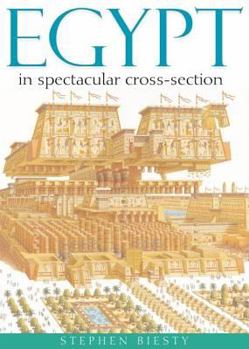Egypt: In Spectacular Cross-Section. Stephen Biesty
(Part of the Stephen Biesty's Cross-Sections Series)
Select Format
Select Condition 
Book Overview
Million-copy best-selling creator of the Incredible Cross-Sections series now brings his talent to a new challenge: ancient Egypt. The year is 1230 B.C., during the reign of Ramses the Great in... This description may be from another edition of this product.
Format:Hardcover
Language:English
ISBN:0199111774
ISBN13:9780199111770
Release Date:August 2005
Publisher:Not Avail
Length:29 Pages
Weight:1.55 lbs.
Customer Reviews
1 rating
Stephen Biesty's glorious cross-sections take us on a journey down the Nile
Published by Thriftbooks.com User , 18 years ago
The premise of "Egypt: In Spectacular Cross-Section," which features the captivating artwork of Stephen Biesty, is that eleven-year-old Dedia and his father, Captain Wennufer, undertake a 39-day journey down the Nile River during the reign of the Pharaoh Ramses the Great in the year 1230 B.C.E. Officially Ramses II, he is commonly believed to be the pharaoh of the Exodus, although this is in dispute. His mummy has been unwrapped, so that we can actually see what he looks like, although he is alive and well within the confines of this volume. Dedia and his father travel down the great river, delivery cargo as they go, eventually arriving at Piramesse, the site of the magnificent royal palace of Ramses. There Nebre, Dedia's uncle, a rich and important scribe, is getting married. The downside to the journey is that Dedia's stern aunt Meritate and know-it-all daughter Ipuia are coming along on the trip. The journey is laid out in the first "chapter" (a two-page spread), so that you can see exactly what Dedia and his relatives will be visiting as they journey to the mouth of the Nile. Young readers get to see quarrying at Gebel el-Silsila, Amun-Ra's temple at Karnak (which is what you see on the cover), the Valley of the kings, the town of Deir el-Medina, where there is a funeral taking place for the headman (9involving the seven stages of mummification), Saqqara's Step Pyramid, the farmers working the fields of the fertile Nile, and finally Ramses' palace at Piramesse. The back of the book contains a Glossary of not only key terms, from "afterlife" to "Underworld," but lists of both the Kings and queens, as well as the deities, mentioned in the text (where you learn whose face is supposed to be on the Great Sphinx of Giza and the difference between Osiris and Horus). The fun here is how Biesty's artwork reveals extraordinary details about life in ancient Egypt to an extent rarely seen outside of books asking the eternal question, "Where's Waldo?" Fortunately, the key details are labeled, such as the escaped monkeys on the ship docked at Elephantine, the accident at Amun-Ra's temple at Karnak, and the oven fueled by dried cow dung at the Deir el-Medina stopover. You will have no trouble spotting the pharaoh at his palace. Biesty's artwork is complimented the writings of Stewart Ross, Delia Pemberton, Joan Fletcher, and Edward Bleiberg, who evidently aided and abetted Biesty in his meticulous research and noteworthy attention to detail. Consequently, the illustrations contained herein can claim to be as authoritative as they are beautiful. But they are also fun, because there are always unusual and funny activities and encounters in every scene. Still, the primary emphasis is on taking a look inside the major monuments and buildings in ancient Egypt and get a sense for how they were built, while also getting a clear indication of how these ancient people lived, worked, and played. Also available is a similar book on ancient Rome.





